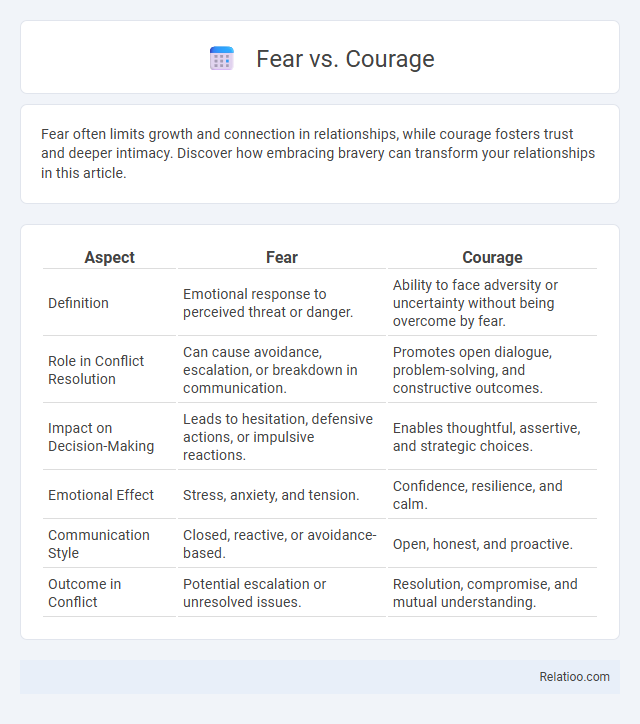Fear often limits growth and connection in relationships, while courage fosters trust and deeper intimacy. Discover how embracing bravery can transform your relationships in this article.
Table of Comparison
| Aspect | Fear | Courage |
|---|---|---|
| Definition | Emotional response to perceived threat or danger. | Ability to face adversity or uncertainty without being overcome by fear. |
| Role in Conflict Resolution | Can cause avoidance, escalation, or breakdown in communication. | Promotes open dialogue, problem-solving, and constructive outcomes. |
| Impact on Decision-Making | Leads to hesitation, defensive actions, or impulsive reactions. | Enables thoughtful, assertive, and strategic choices. |
| Emotional Effect | Stress, anxiety, and tension. | Confidence, resilience, and calm. |
| Communication Style | Closed, reactive, or avoidance-based. | Open, honest, and proactive. |
| Outcome in Conflict | Potential escalation or unresolved issues. | Resolution, compromise, and mutual understanding. |
Understanding the Nature of Fear
Fear is an evolutionary survival mechanism that triggers the body's fight-or-flight response when faced with perceived threats. Understanding the neurobiological basis of fear, including the amygdala's role in processing threats, helps distinguish rational fear from irrational anxieties. Courage arises as a conscious response that overrides fear by leveraging prefrontal cortex functions to assess risk and take action despite apprehension.
What Courage Truly Means
Courage truly means facing your fears head-on despite uncertainty or potential failure, transforming fear into a source of strength rather than a barrier. Your ability to act with bravery in the presence of fear defines courage, highlighting resilience and determination. Understanding that courage is not the absence of fear but the mastery of it empowers you to overcome challenges and grow.
Psychological Roots of Fear
Fear originates from the amygdala's response to perceived threats, triggering the fight-or-flight mechanism crucial for survival. Courage arises when the prefrontal cortex overrides this fear response, enabling decision-making in the face of danger. Understanding these neural pathways highlights how fear and courage interplay within human psychology, influencing behavior and emotional resilience.
The Science Behind Courage
Courage is the brain's response to fear, activating the amygdala and prefrontal cortex to regulate emotional and rational processing. Your nervous system releases adrenaline and cortisol to prepare you for action, while neurotransmitters like dopamine reinforce positive outcomes associated with bravery. Scientific studies show that repeated exposure to fear stimuli can strengthen neural pathways, enhancing your capacity for courageous behavior over time.
Fear’s Impact on Decision-Making
Fear significantly influences decision-making by triggering stress responses that narrow cognitive focus and limit problem-solving abilities. This emotional state often leads to risk aversion, causing individuals to avoid uncertain outcomes despite potential benefits. Courage counteracts fear by enabling rational evaluation of threats, fostering calculated risks and proactive choices that drive personal growth and resilience.
How Courage Transforms Lives
Courage transforms lives by enabling individuals to confront fear and pursue growth despite uncertainty, fostering resilience and self-confidence. This transformative power encourages stepping beyond comfort zones, resulting in personal achievements and stronger emotional well-being. Embracing courage leads to empowerment, inspiring positive change and overcoming challenges that fear alone might otherwise inhibit.
Common Misconceptions about Courage and Fear
Many people mistakenly believe courage means the absence of fear, but true courage involves acting despite fear's presence. Fear often serves as a protective mechanism, signaling potential danger, whereas courage requires recognizing fear and choosing to move forward regardless. You can strengthen your courage by understanding that fear is natural and not a weakness but a necessary part of growth and bravery.
Practical Strategies to Overcome Fear
Practical strategies to overcome fear involve recognizing and confronting your fears through gradual exposure and mindful breathing techniques that reduce anxiety. Building courage requires consistent practice of positive self-talk and setting small, achievable goals that boost confidence over time. By integrating these methods, you empower yourself to transform fear into proactive courage, enhancing your ability to face challenges effectively.
Building and Sustaining Courage
Building and sustaining courage involves actively confronting fear rather than avoiding it, engaging in repeated exposure to challenging situations that gradually diminish fear's intensity. Neuroscientific studies reveal that courage strengthens neural pathways related to emotional regulation, enabling individuals to maintain focus and resilience under stress. Consistent practice of mindful reflection and goal-oriented actions fosters a sustainable courage mindset, essential for personal growth and effective decision-making.
Embracing Growth: Choosing Courage over Fear
Choosing courage over fear empowers individuals to embrace growth by stepping outside comfort zones and confronting challenges head-on. Courage fosters resilience and unlocks potential, enabling personal development and transformative experiences. Fear, while a natural response, often hinders progress by limiting opportunities for learning and self-improvement.

Infographic: Fear vs Courage
 relatioo.com
relatioo.com